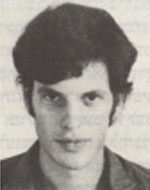Naftali, son of Chaya and Dov, was born on March 25, 1949, in Kibbutz Mishmar Hasharon. He attended elementary school in Mishmar Hasharon and later completed high school at Givat Hayim-Ihud. Naftali, who was known as Dolly, was a diligent student who excelled in the real professions. His classmates testify to him, who was the best among them in mathematics, physics, and chemistry. Every time they encountered a problem, Naftali would find the way to a solution. In the class Naphtali was a quiet, modest boy, but when he was asked, he spoke in a quiet voice, and every word he uttered was deliberate and deliberate. He had great patience and devoted a great deal of time to helping his friends in school as well as in social activities. Naftali was drafted into the Israel Defense Forces in mid-November 1967 and began his military career in the Air Force in a pilot’s course, where he managed to enjoy the flight experience, but did not finish the course and was transferred to the armored corps. He was an excellent professional, knew the tank on his own and managed to impart his knowledge to his students, and Dali was a meticulous instructor who demanded the complete execution of the army’s orders, but At the same time he disliked discipline and was a good friend of his subordinates, he understood He did everything he could for them. Mid-November 1970 was released from compulsory service and assigned to a reserve unit of the Armored Corps. This unit was called for the reserve service along with the bread in the War of Attrition. After completing his military service he asked Naftali leave for academic studies. His decision was determined and he insisted, until the kibbutz decided to allow him to leave for studies. He studied at the Faculty of Electrical Engineering at the Technion in Haifa. While at home in the kibbutz, he worked in electrician and excelled in great skill, improvisational ability and invention. His room in the kibbutz was also full of inventions and innovations, which aroused the curiosity and admiration of his kibbutz friends. Wherever technical skill and agility were required, Naftali was there, studying the structure of a defective device and finding the way to repair and improve it. He was active in the social life of the agriculture, was a member of the youth division of the Union of the Kibbutzim and the Kibbutzim and was an outstanding athlete who was a member of the basketball team of Mishmar Hasharon. Dolly had a charming sense of humor and great talent in writing sketches and filitons, which testified not only to the sense of humor, but also to the ability to criticize seriously in a light and entertaining atmosphere. His friends in the agriculture describe him as a quiet and orderly man, a man of action, who was firmly anchored in reality. Only a few knew Naftali the other – the man with the sensitive and loving soul. He and his friend Dorit built a world full of warmth and love, a world of emotions and desires that few people have been able to grasp. His sensitive and loving figure is revealed between the lines of his many letters, which he sent to his friend and family. In one of the letters, sent to his friend during the fighting in Sinai, a sentence appears that distinguishes Naftali’s character and approach: “Life is too Yaffa to waste them here.” During the Yom Kippur War, his unit participated in the battles of containment and infiltration against the Egyptians in the Sinai. On October 15, 1973, Dili participated in the battle for the “Chinese Farm,” which was difficult and bitter, and our forces suffered many casualties, and on that day, a short distance from the place of his fall, “Yedioth Ahronoth wrote about Naftali’s fighting:” During that very hour his brother, Lieutenant Asher, fought in his tank. They did not know that they were close to each other. They did not know that the employerFor both dunes lies death. Naftali was killed in the “Chinese Farm”. Two brothers, the same fate. Naftali was declared missing. The search squads, who went beyond the lines after the war, found his body. Naftali left behind his parents and sister, and after his fall was raised to the rank of First Sergeant, and his friends published a booklet in his memory, which included the words of his classmates, his work and his weapon.
